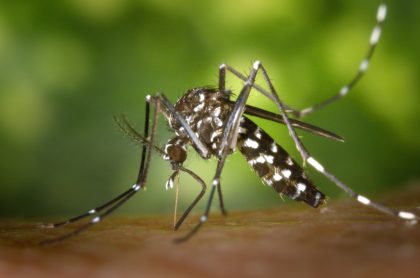
Dark energy, or the possible lack thereof, grabbed a lot of headlines at the end of the year. However, it sounds like rumors of its demise are probably premature. This is a pattern in science, especially science journalism and popular science. An alternative to the consensus, previously only known within its field, comes to wider attention and causes a stir. The alternative idea seems to make sense to a lay audience because it is presented only in the context of the data that best match that idea. But the experts know that there is additional context which provides good reasons why they haven’t yet overturned the consensus. Another recent example was the modified Newtonian dynamics alternative to dark matter, which can fit galaxy rotational speed data, but doesn’t explain a variety of other observations that dark matter does.
With the changing administration and the nomination of Robert Kennedy, Jr. to lead the Department of Health & Human Services, something similar may happen with respect to vaccines. I thought it might be useful to go ahead and provide the additional context now so that we’re better informed for future conversations. Kennedy has voiced concerns about vaccine safety, and of course no one wants our vaccines to be unsafe, especially the ones we give to newborns and young children. One of his concerns is the nature of the clinical trials for vaccines; I gather he would like to see longer trials with different placebos used. (Some folks seem to just want to eternally be skeptics and naysayers and so no alternative would satisfy them, but let’s assume for now he is arguing in good faith.) The clinical trials for a dengue virus vaccine (brand name Dengvaxia) are held up as both a model and a cautionary tale in favor of an alternative, longer approach to vaccine trials. The participants were followed for years, and significant negative outcomes were observed in some cases. Is this evidence for changing our approach to all vaccine trials, or is there something unique about dengue virus that prompted a different approach and led to different outcomes?
There are four serotypes of dengue virus in circulation that cause human illness. A serotype is variant of a virus (or other microbe) that is different enough from its relative(s) that it does not react strongly with antibodies specific to the other variant(s). So if you get infected with one serotype of dengue virus, you develop antibodies that protect you from reinfection with that same serotype, but they offer only limited protection from infection with the other serotypes. This is typical of microbes with different serotypes. This is why they’ve been updating the formulation of the COVID-19 vaccines and why some vaccines for other microbes contain multiple serotypes. And that’s why the dengue vaccine contains all four serotypes of the dengue virus.
However, there is an additional complication with the dengue virus serotypes. Sometimes infection with one serotype not only fails to provide protection from infection with another serotype, but it also increases the chances of more severe symptoms from that second infection. That’s because the antibodies for the non-matching serotype have some binding to the virus in a way that actually enhances their infectivity rather than inhibiting it.

This kind of antibody-dependent enhancement of infection is not typical of all microbes, although it has been observed in a couple of other cases (more below). It was well-known for dengue virus long before the Dengvaxia vaccine was developed. And so the possibility that the vaccine could exhibit this same complication was known to the developers of the vaccine and the designers of the clinical trials. The expectation from including all four serotypes in the vaccine was that strongly binding antibodies for each would be made and those would dominate over the weak cross-type binding that might enhance infection, but that hypothesis would have to be tested. Unfortunately, it was found that some antibody-dependent enhancement must still be occurring, because vaccination was associated with an increased risk of severe disease among children who were not previously infected with dengue virus.
These particulars of dengue virus biology were the reason for the extended trials and why severe outcomes were observed in these trials that are not expected to be seen in vaccine trials for other microbes. It would be surprising to see a vaccine elicit antibody-dependent enhancement of infection if that did not occur from infection with the microbe itself, since the vaccine is made from the pathogen or a part of it.
Now, for a brand new or new-to-humans pathogen like SARS-CoV-2 (the virus that causes COVID-19), we can’t know if antibody-dependent enhancement occurs in natural infection, at least not right away. An underappreciated aspect of the COVID-19 vaccine story is that we were actually well-prepared for that scenario. Although the SARS outbreak that began in 2002 was eventually ended without a vaccine, development of a vaccine was pursued using the infamous coronavirus spike protein as a target. Early animal testing showed some evidence of antibody-dependent enhancement. Further research showed that if a specific part of the spike protein was left out of the vaccine, no evidence of enhancement was observed. So when it came time to make a SARS-CoV-2 vaccine, that same part of the spike protein was left out. And to date, no evidence of enhancement of infection associated with the vaccine has been reported. By doing that research on the SARS-CoV-1 vaccine over a decade earlier, we saved months if not years of experiments that would have been needed to identify the problem and its solution.
Circling back to the dengue vaccine, it is certainly reasonable to notice that the trials for that vaccine were different and had different outcomes and to ask questions about how that relates to trials for other vaccines. And it is reasonable to have different opinions on what to value when designing clinical trials. If these issues gain wider focus in coming weeks or months due to the change in administration, I don’t want folks to feel like they can’t ask questions. I just want them to have all of the relevant information. If you need someone to ask your questions, feel free to reach out to me. If the comments aren’t working or you want to ask a private question, feel free to reach out on Facebook, ex-Twitter or Bluesky. I’m not a physician, so I can’t offer personal medical advice, but I can talk about the science of microbes and vaccines and help find answers to anything I don’t know myself.
Andy has worn many hats in his life. He knows this is a dreadfully clichéd notion, but since it is also literally true he uses it anyway. Among his current metaphorical hats: husband of one wife, father of two teenagers, reader of science fiction and science fact, enthusiast of contemporary symphonic music, and chief science officer. Previous metaphorical hats include: comp bio postdoc, molecular biology grad student, InterVarsity chapter president (that one came with a literal hat), music store clerk, house painter, and mosquito trapper. Among his more unique literal hats: British bobby, captain’s hats (of varying levels of authenticity) of several specific vessels, a deerstalker from 221B Baker St, and a railroad engineer’s cap. His monthly Science in Review is drawn from his weekly Science Corner posts — Wednesdays, 8am (Eastern) on the Emerging Scholars Network Blog. His book Faith across the Multiverse is available from Hendrickson.

Leave a Reply